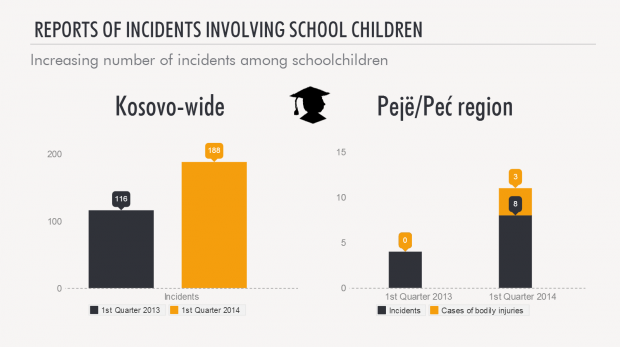Preventing school violence and bullying through awareness-raising
Kosovo Police and the OSCE join forces to educate thousands of school children across Kosovo on responding to prejudice and preventing hate crimes.
“Who watched the Champions League semi-final last night?” asks Lieutenant Fadil Gashi to the 8th graders of the Xhemajl Kada primary school in Pejë/Peć. Everyone’s hand goes up. “Good. Did you see the ‘NO TO RACISM’ banner and what do you think it means?” comes the second question. Again pupils, boys and girls, compete to take the floor. “It’s about respecting each other despite the differences we may have,” Liridona Lajçi responds swiftly.
These lectures are a part of an OSCE-supported initiative aimed at raising awareness on tolerance, prejudice, and hate crimes. Throughout Kosovo 10,140 school children from 65 primary and 45 secondary schools attended such as this one. Xhemajl Kada is a mixed school with students from Kosovo Albanian, Bosniak, and Roma communities. Police say there has been an increase in tensions between Kosovo Albanian and Bosniak schoolchildren here.
According to their data, a total of 45 incidents involving school children were reported to police in Pejë/Peć region in 2013. This figure doubled when comparing first quarters of 2013 and 2014, from 4 to 8 respectively, including three cases of bodily injuries. The numbers are sadly similar throughout Kosovo. The first quarter of 2013 saw 116 cases involving school children reported to police. This number rose to 188 for the same period of 2014.
Prevention is key
Through our regular monitoring and work with the police we observed an increase in the number of incidents at schools, including physical assaults, threats and other major offences. Once we analysed the figures we realized that there is a clear need for prevention. We started by developing a training manual and lesson plans for the police, and then conducted a three-day training of trainers for 26 police officers from all police regions in Kosovo who specialize in working with school children. They went on to train their colleagues to deliver the lectures.
Anita Pasha, National Programme Officer, Security and Monitoring Section, Human Rights and Communities Department, OSCE Mission in Kosovo
The initiative is part of a larger hate crimes programme developed and implemented by the Mission, which included a number of capacity building activities and specialised trainings for the police. The aim was to train the police how to teach school children about bias, harassment, and intolerance in schools, thus preventing conflicts and potential hate crimes.
“In addition, the police themselves showed interest as this was relatively unfamiliar topic for them,” Pasha said. The Mission supported the programme by facilitating links between the police and educational and judicial authorities to ensure a consolidated response to the violence.
“It’s all new to me”
“I found the lecture very informative. I’m the daughter of a police officer, but I have to admit I was not aware of these issues. It will help us deal with such situations,” says Liridona. She said she would spread that information as much as possible among her friends, confident that incidents will decrease in her school after the lectures. “It’s the least we can do. Crime is the end of a cycle that starts with intolerance and prejudice. We don’t want to see that in our school.”
Joining efforts
According to the police and school authorities, trainers, as well as the participants, the lectures series proved to be successful. Based on this feedback, as the Mission intends to continue helping both the police and schools deal with issues affecting pupils’ security.


